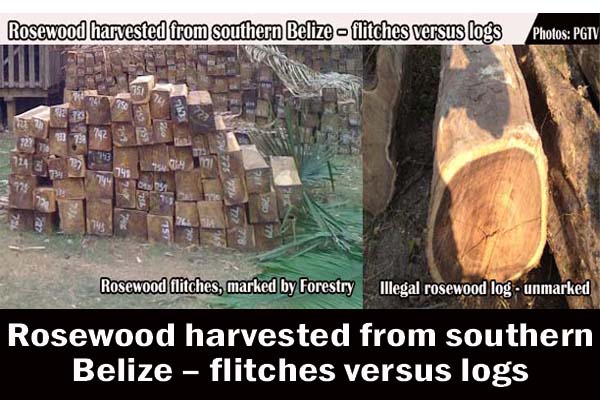Illegal loggers more aggressive for rosewood, despite moratorium
Not only do illegal loggers—mostly Central American migrants working in Belize—continue to ignore the moratorium imposed by the Government in March 2012 on rosewood extraction; but it appears that they have become more aggressive in extracting this prized hardwood from the forest, with latest reports that they have shifted to transporting raw logs rather than processed flitches, in order to more readily evade law enforcement authorities.
“Of late, we have been receiving quite a lot of information regarding illegal rosewood harvest in northern Toledo and south Stann Creek,” Chief Forest Officer Wilber Sabido told Amandala today.
He said that the problem seems more pronounced in areas such as Bella Vista, Trio, Deep River Bank, and the Medina area, and they “keep getting reports that people are extracting rosewood logs as opposed to rosewood flitches”—an indication, Sabido said, that they are trying to get out of the forest more quickly.
Previously, the rosewood logs were converted to flitches in the forest, and then trucked away. Some people question why law enforcement officials have not been able to catch the culprit who is behind what is evidently an organized illegal logging operation.
Concerns have also been expressed that the Forestry Department has not been moving fast enough to confiscate logs when they receive reports of illegal logging; however, Sabido told us, “We try to respond as best we could.”
In the most recent case, in which PGTV News reported on the find of 7,000 board feet of rosewood, Sabido said that they were able to detain one person in the Bella Vista area who had 10 logs – measuring roughly 160 board feet. That person faces a charge of illegal possession and is due to be arraigned on April 24.
He told us that around the same time that they received that report, they received another report of an illegal logging operation in progress.
We asked Sabido about allegations that a Chinese businessman residing in rural Toledo is behind the rosewood pillaging. (This seems plausible since the rosewood is believed to be destined for the China market.)
He told us that the department had gotten testimony from people saying it is a Chinese fellow who hires them, and they at one point had detained the Chinese man in question. Sabido said, though, that none of the loggers were willing to give an affidavit as evidence, so that they could charge him.
Although several persons have been taken to court, the fines are trivial compared to the hundreds of thousands of dollars that could be earned from the sale of the rosewood on the foreign market.
Sabido said that fines have ranged from $500 to $1,000, and so they are not much of a disincentive. He told us that the Forest Department also asks the court to impose jail time; however, the only instance in which that was done was for a repeat offender, who was back to his illegal logging activities within weeks of having been fined by the court.
Sabido affirmed that the rosewood moratorium is still in effect. He noted that the spike in illegal logging operations, which Sabido says usually occurs in the summer, jeopardizes the rosewood inventory currently being done by the department. They hope to conclude that assessment in late May or early June.
The Chief Forest Officer also told us that the Forestry Department will also present recommendations for the Minister of Forestry to table at Cabinet, suggesting how they can proceed with the management of the remaining rosewood stock in Belize—but if the pillaging continues unabated, he said, there may not be any rosewood left to assess.
“It boils down to a human resource challenge,” Sabido told us.
He said that the staff in Toledo is being doubled, and six officers are being mobilized to the south today to aid the two officers in Savannah and the four officers at Machaca – the two Toledo forest stations. The reprioritization of staff to address the high frequency of reports of illegal logging could mean that other parts of the country will be vulnerable to illegal forestry activities, but they believe it is important that the Forest Department does “a sweep” in the south of the country, Sabido said.
He told us that it is “self-defeating” for illegal logging activities to keep escalating, even as they are engaged in a stock assessment, and if this problem continues, “we won’t have any material to assess…”
Sabido said that the intention is to eventually lift the moratorium to permit harvesting on a controlled basis, if the data shows that this would be sustainable.
He suspects that the rosewood is being smuggled via the Belize-Guatemala border, at Jalacte, Toledo, where, he said, it is very easy to evade law enforcement. The official suggested that it is not only timber that passes through that hole in the border – but also humans and ammunition, in illicit trafficking operations.

